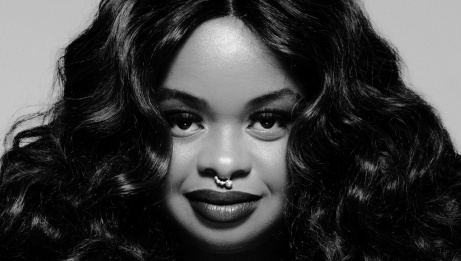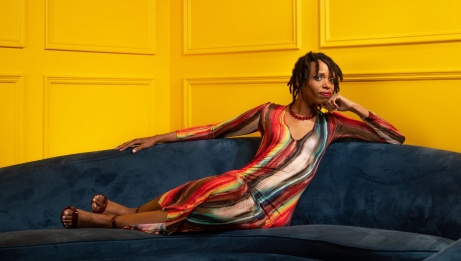Years ago, due to one of those randomnesses in life, a young woman at the beginning of her career managed to find one of her great inspirations, who gave her the following advice: always be honest and truthful. And so it was. Black, full, powerful and with nothing to prove, Tássia Reis has been following the words she heard from Erykah Badu and her work is a reflection of that. Authentic and true are adjectives that describe well everything that comes out of the mind and mouth of the artist who started her career as a rapper at a time when the scene was still a predominantly male territory.
Without worrying about challenging the status quo or about allowing herself to be stigmatized, Tássia comes, always and in a growing movement, absorbing the world at her whim, rejecting conventional roles and aesthetic standards to follow her path as she well understands and, above all, without falling into clichés.
Committed out of spontaneity and not out of obligation, the artist has been actively taking a stand on racism, social inequality and fatphobia, but also on relationships, sex and love. Thus, it is not false to say that the artist brings to her work life as it is, in all its completeness of themes.
The same applies in the musical sphere. Bringing a great heritage of Afro-Brazilian culture, particularly samba and pagode, added to a strong influence of artists who represent, in different musical strands, black culture in all its magnitude, ranging from Erykah Badu to Beyoncé and Rihanna, passing through Brazilian national icons such as Djavan and Alcione, the artist, recognized as one of the most prominent rap voices in Brazil, was never satisfied with marked places, which allowed her to remain open to exploring other paths.
Trying out all the options available on the menu, Tássia makes her own musical buffet with what she has in mind, at hand, so she has no shortage of raw materials. Grown in an environment where samba was always present, including the vibe of many carnivals with their samba plots, the artist went along her journey exploring other possibilities, such as jazz. So, 10 years ago, she released the track "Meu RapJazz" (2013), which put her in the international spotlight. Once again impeccable, the narrative is clean and acidic as a good rap demands and the melody, of course, brings the sophistication of jazz. While the piano plays, softly, keeping the track's elegant proposal, the voice, also soft and absolutely sensual, opens up: “I don't have time to lose, I want to win for myself and fight for you if it's up to me, I'll deserve the respect that I learned that I must fight to have, that made me stronger. If I wasn't sagacious, I'd be on another ride”. Simple as that, the message is given.
Following her exploratory journey, Próspera, her third album, released in 2019, which was acclaimed by specialized critics and considered one of the best albums of the year by APCA (Associação Paulista de Críticos de Arte), illustrates well the artist’s ability to flirt with other rhythms and expose, with a certain mockery, her existence or rather, of all of us. In "Dollar Euro", for example, Tassia does not miss the opportunity to mock her own economic rise and, even more, expose racism. ”They cannot put up with the black ones /Who work hard and make money money / They only think that chicks like me are there to serve (Who?)”
Used to tell it like it is, Tássia does not follow any agenda, except hers. Dancing according to her music, with each work she is freer, without filter, as is the case of her new single, "Rude". Launched at a time when the country was still under the effect of very heavy energy, being led by conservative and extremist politics, expressing was even more urgent and necessary.
This way, bringing a mix of Drill with funk carioca and samba, the new track is an explosive mix of entire truths and precise beat, where the artist detonates themes such as money, career, lifestyle, aesthetic standards and so on, causing "Rude" to hang out without asking for permission, almost like a punch. The most interesting, however, is that listening once is asking for more. "Hahahahahahahaha/ Oh, and isn’t it hot?" she teases, ending the song and hitting it, once again, in full. Yes, listening to "Rude" is more than hot, it is an experience that, in one way or another, creates a connection with the protagonist, making the listener want to know more about that ‘ride’, perhaps even to be part of it. This is one of Tássia's talents, being able to engage the audience with her narrative that, rude or not, only delivers truths. How not to want more?
Thus, in a crescent, Tássia remains firm in her protagonism that can come packed with jazz, rap, drill, funk, pop, samba doesn’t matter because what makes this artist what she is, giant in her talent, is her ability to tell stories, to be heard above other voices, leaving her message, rude, soft, sensual, as you want, or rather, as she wants, because one thing is certain, Tássia Reis is the boss, she is in charge.
Discography
Tássia Reis (2013)
Outra Esfera (2016)
Próspera (2019)
Próspera D+ (2021)
Rude (2022 - single)
Il y a des années, à cause d'un de ces hasards de la vie, une jeune femme au début de sa carrière a réussi à rencontrer une de ses grandes inspirations, qui lui a donné le conseil suivant: sois toujours honnête et véridique. Et il en fut ainsi. Noire, complète, puissante et n'ayant rien à prouver, Tássia Reis a suivi les paroles qu'elle a entendues d'Erykah Badu et son travail en est le reflet. Authentique et vrai sont des adjectifs qui décrivent bien tout ce qui sort de la tête et de la bouche de l'artiste qui a commencé sa carrière de rappeuse à une époque où la scène était encore un territoire majoritairement masculin.
Sans se soucier de remettre en cause le statu quo ou de se laisser stigmatiser, Tássia a depuis toujours, et dans un mouvement grandissant, absorbant le monde à sa guise, rejeté les rôles conventionnels et les normes esthétiques pour suivre son chemin comme elle l'entend et, surtout, sans tomber dans les clichés. Engagée par spontanéité et non par obligation, l'artiste prend activement position sur le racisme, les inégalités sociales et la grossophobie, mais aussi sur les relations, le sexe et l'amour. Ainsi, il n'est pas faux de dire que l'artiste livre à son œuvre la vie telle qu’elle est, dans toute sa complétude de thèmes.
Il en va de même dans le domaine musical. Apportant un grand héritage de la culture afro-brésilienne, en particulier la samba et la pagode, ajouté à une forte influence d'artistes qui représentent, dans différents aspects musicaux, la culture noire dans toute son ampleur, allant de la précitée Erykah Badu à Beyoncé et Rihanna, en passant par des icônes nationales brésiliennes telles que Djavan, Mano Brown et Alcione, l'artiste, reconnue comme l'une des voix de rap les plus en vue au Brésil, ne s'est jamais contentée de lieux balisés, ce qui lui a permis de rester ouverte à l'exploration d'autres voies.
Essayant toutes les options disponibles sur le menu, Tássia compose son propre buffet musical avec ce qu'elle a en tête, à portée de main et elle ne manque donc pas de matière première. Ayant grandi dans un environnement où la samba était toujours présente, y compris la vibe de nombreux carnavals avec leurs sambas enredo, l'artiste a poursuivi son parcours en explorant d'autres possibilités, comme le jazz. Ainsi, il y a 10 ans, elle a sorti le morceau Meu RapJazz (2013), qui l'a définitivement mise sur le devant de la scène internationale. Encore une fois impeccable, la narration est propre et acide comme l'exige un bon rap et la mélodie, bien sûr, apporte la sophistication du jazz. Tandis que le piano joue, doucement, en maintenant l'élégante proposition du morceau, la voix, également douce et absolument sensuelle, livre la réalité : "Je n'ai pas de temps à perdre, je veux gagner pour moi-même Et me battre pour toi Si ça ne tient qu'à moi, Je vais le mériter, Le respect que j'ai appris pour lequel je dois me battre Cela m'a rendu plus forte, Si je n'étais pas sagace, Je serais dans un autre trip”. Aussi simple que cela, le message est donné.
Continuant son parcours exploratoire, Próspera, son troisième album, sorti en 2019, plébiscité par la critique spécialisée et considéré comme l'un des meilleurs albums de l'année par l'APCA (Associação Paulista de Críticos de Arte), illustre bien la capacité de l'artiste à flirter avec d'autres rythmes et exposer, avec une certaine dérision, son existence ou plutôt celle de nous tous. Dans Dollar Euro, par exemple, Tassia ne manque pas l'occasion de se moquer de sa propre ascension économique et, plus encore, de dénoncer le racisme. "Ils ne supportent pas les noires / Qui travaillent dur et font du pognon / Ils pensent que les filles comme moi ne sont là que pour servir (Qui?)"
Habituée à être vraie, Tássia ne suit aucun agenda, sauf le sien. Dansant selon sa musique, à chaque œuvre elle se montre plus libre, sans filtre, comme c'est le cas avec son nouveau travail, Rude. Sorti à un moment où le pays était encore sous l'emprise d'une énergie très lourde, dirigé par une politique conservatrice et extrémiste, la prise de parole était encore plus urgente et nécessaire.
De cette façon, apportant un mélange de drill avec du funk carioca et de la samba, le nouveau morceau est un mélange explosif de vérités entières et de rythme précis, où l'artiste fait exploser des thèmes comme l'argent, la carrière, le style de vie, les normes esthétiques, etc., faisant en sorte que Rude entre par les oreilles sans demander la permission, presque comme une raclée. Mais le plus intéressant, c'est qu'écouter une fois, c'est en redemander. "Hahahahahahahaha / Ai ai, n'est-ce pas délicieux?" provoque-t-elle, finalisant la chanson et frappant dans le mille, une fois de plus. Oui, écouter Rude est plus qu'un plaisir, c'est une expérience qui, d'une manière ou d'une autre, crée un lien avec la protagoniste, donnant envie à l'auditeur d'en savoir plus sur ce "trip", voire d'en faire partie. C'est l'un des talents de Tássia, être capable d'engager le public avec son récit qui, grossier ou non, ne livre que des vérités. Comment ne pas en vouloir plus?
Ainsi, en plein ascension, Tássia reste ferme dans son protagonisme qui peut se décliner en jazz, rap, drill, funk, pop, peu importe car ce qui fait de cette artiste ce qu'elle est, géante dans son talent, c'est sa capacité de raconter des histoires, de se faire entendre au-dessus des autres voix, délivrant son message, rugueux, lisse, sensuel, comme vous le voulez, ou mieux, comme elle veut, car une chose est sûre, Tássia Reis est la patronne, c’est elle qui donne le ton.
Discographie
Tássia Reis (2013)
Outra Esfera (2016)
Próspera (2019)
Próspera D+ (2021)
Rude (2022 - single)








